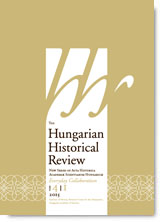Life of an Agent: Re-Energizing Stalinism and Learning the Language of Collaboration after 1956 in Hungary
Life of an Agent: Re-Energizing Stalinism and Learning the Language of Collaboration after 1956 in Hungary
Author(s): Sándor HorváthSubject(s): History
Published by: Magyar Tudományos Akadémia Bölcsészettudományi Kutatóközpont Történettudományi Intézet
Summary/Abstract: In order for a secret police report to be taken seriously, it had to be lodged in the proper form, according to the discursive styles of the state bureaucracy, and in particular the secret police. Thus, the authors of the reports adopted numerous elements of style and rhetoric in order to ensure that their goals would be achieved. How was this bureaucratic style adopted in Hungary, and how did ordinary citizens decide to accommodate to or cooperate with the authorities under the communist regime after the 1956 Revolution? I argue that the creators and editors of the secret police reports (the “unofficial informants” and their case officers) were “sculpting” the official language as an artefact and mapping their social network in accordance with idealized images of the politico-social body. The first step in the implementation of massive, forceful coercion was to change the narratives and the social categories that were used to depict the social status of a “good citizen” and the local communities. In the early phases of their work, during which they learned what was expected of them and how to meet these expectations, the informants mastered the language of the secret police in order to ensure, in the meantime, that they were able to realize their own personal goals in their local communities by taking advantage of their access to the state security network. Thus the function of the reports on the one hand was rhetorical: they were made in order to feed the bureaucracy. On the other, they served as a means with which their authors won approval among other members of the network of their personal, everyday goals. The authoring of reports, which can be understood as a kind of period of training, thus was not simply a matter of exercising social control, but quite the reverse, it also served as a means of appropriating power by members of society in the interests of specific personal goals that had little or nothing to do directly with the agendas of the regime.
Journal: The Hungarian historical review : new series of Acta Historica Academiae Scientiarum Hungaricae
- Issue Year: 4/2015
- Issue No: 1
- Page Range: 56-81
- Page Count: 26

